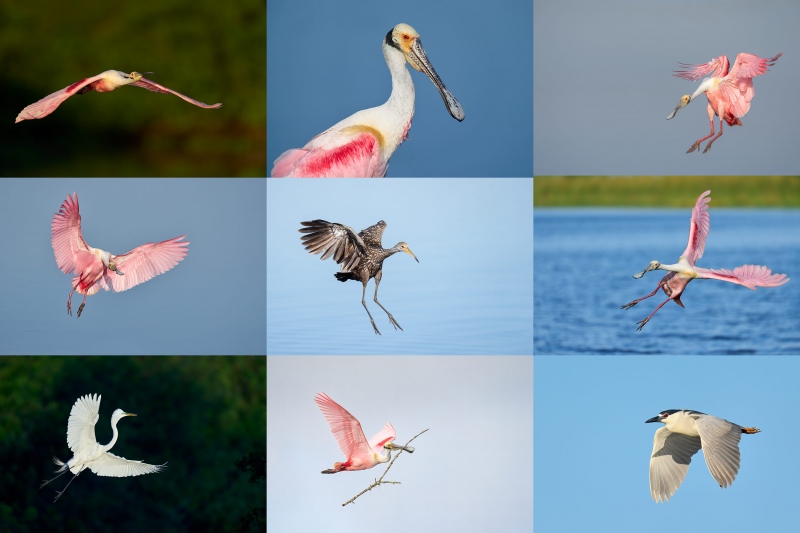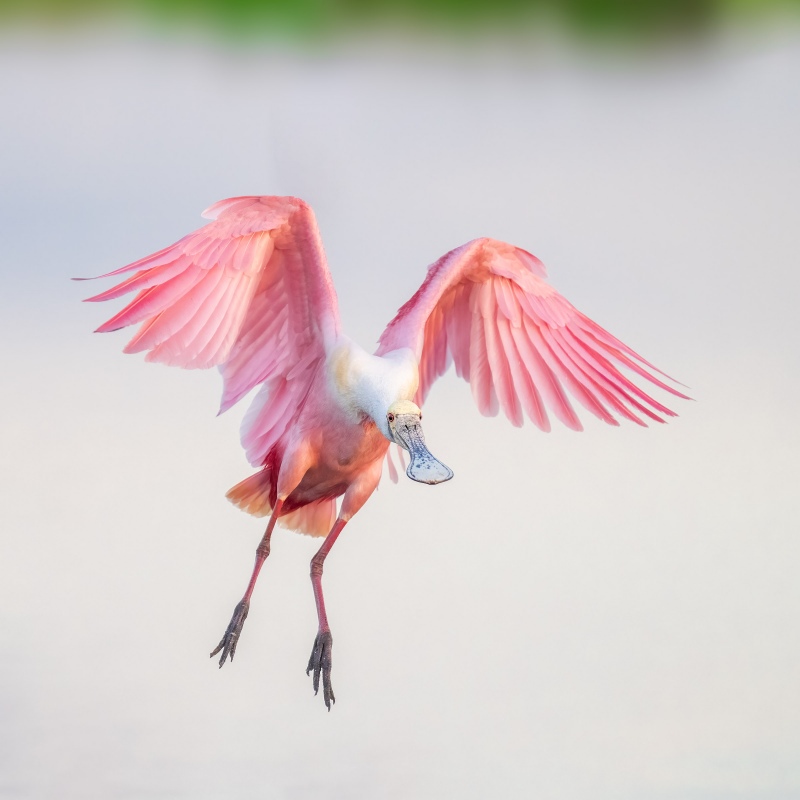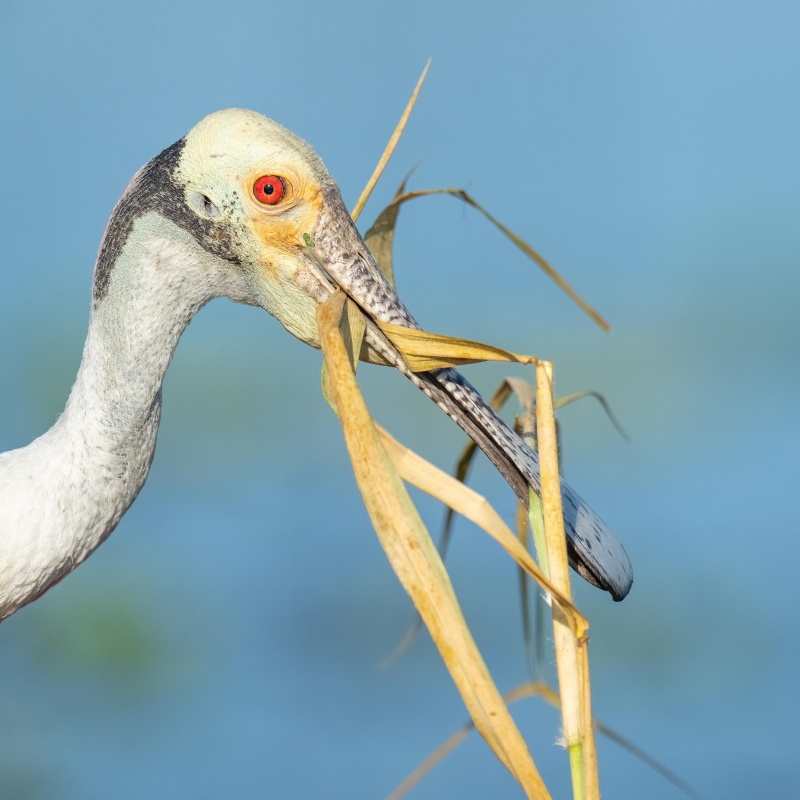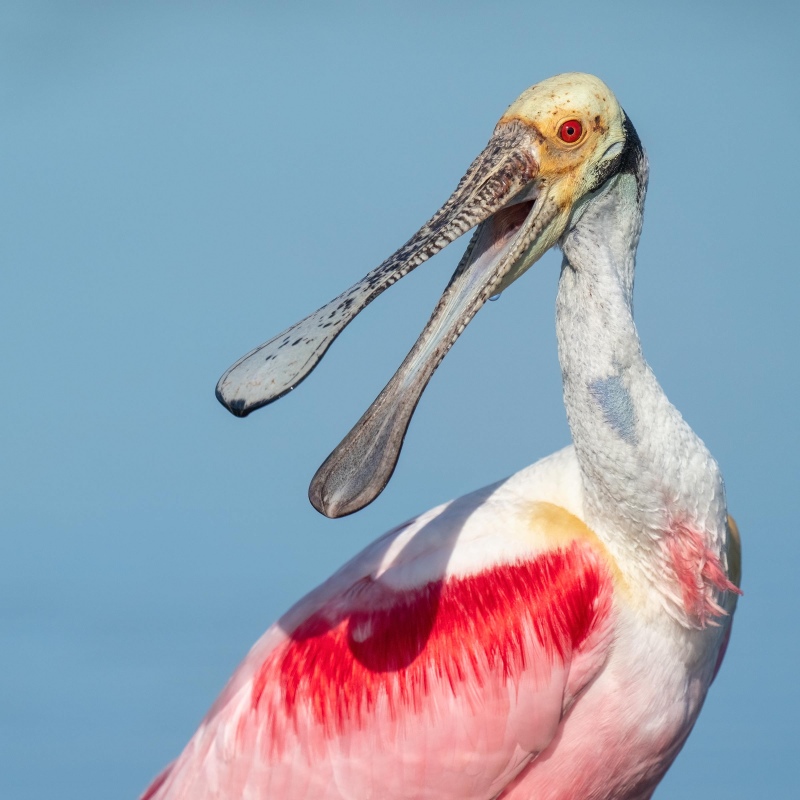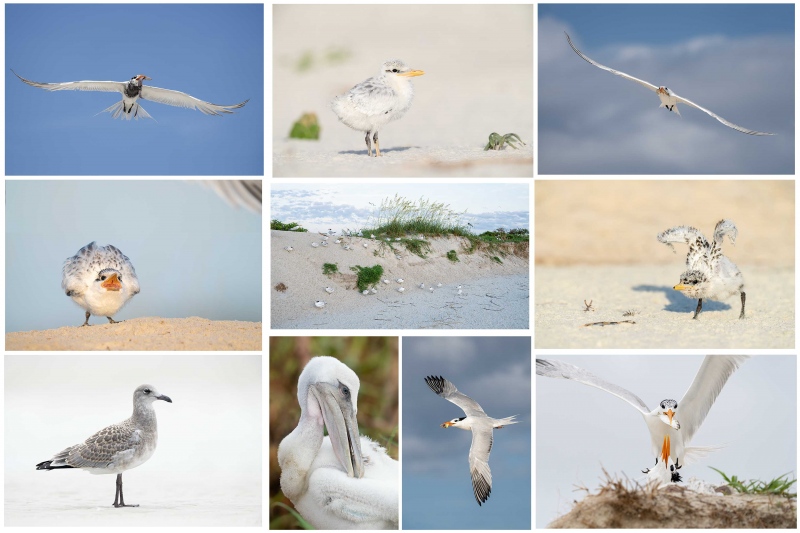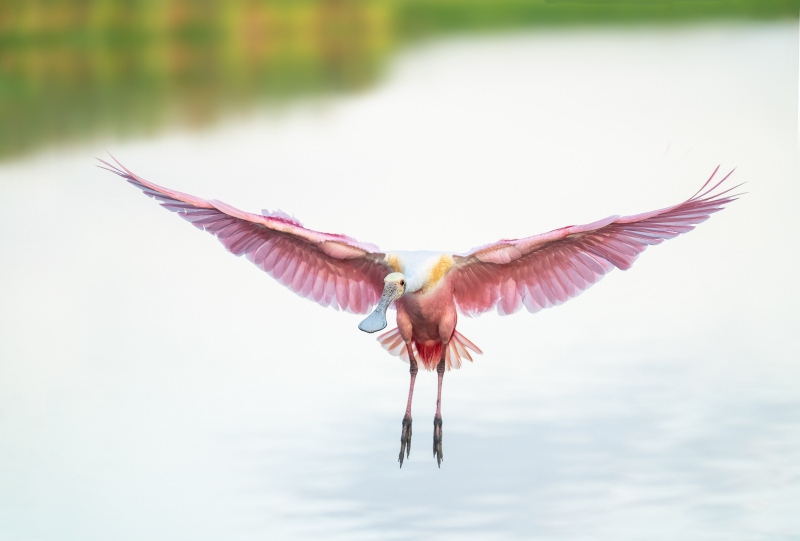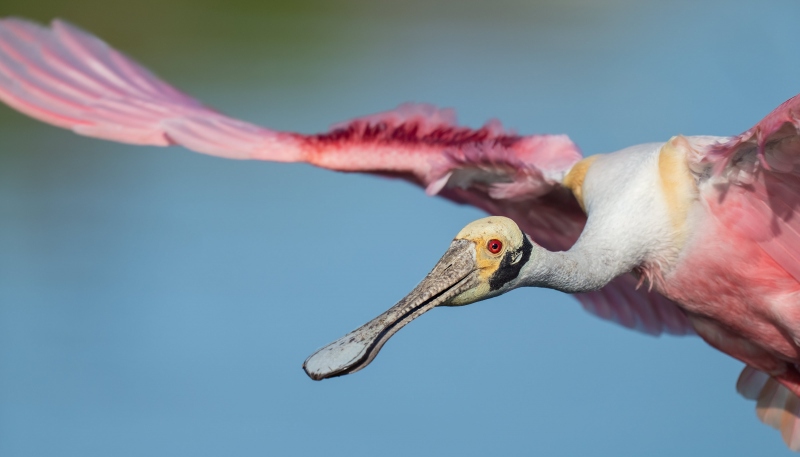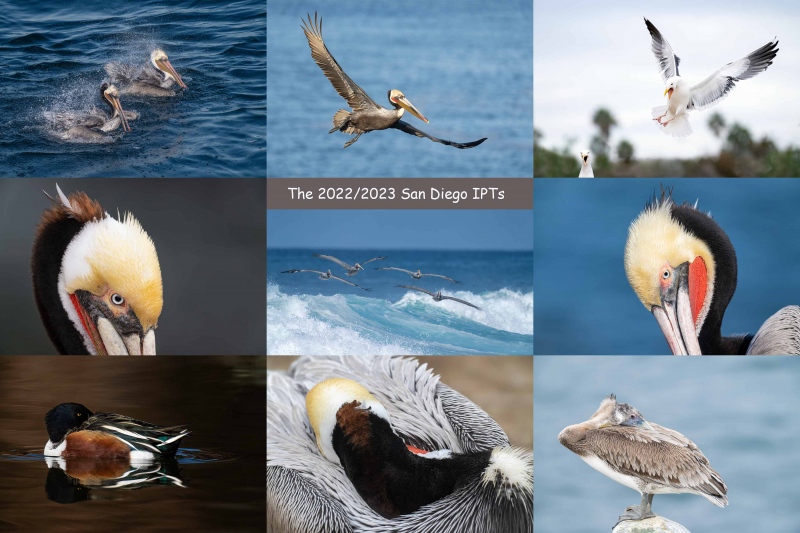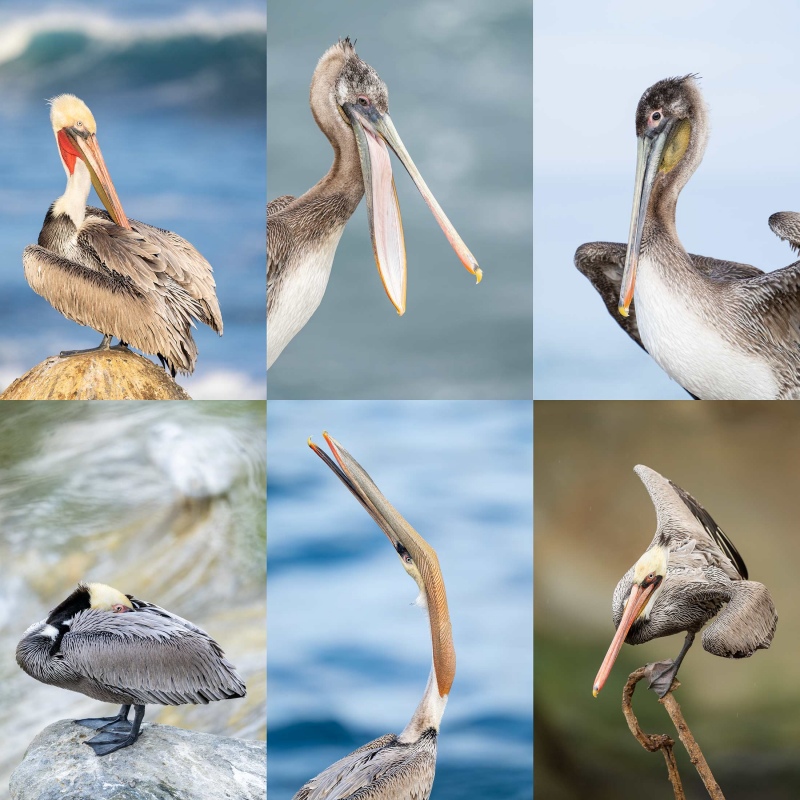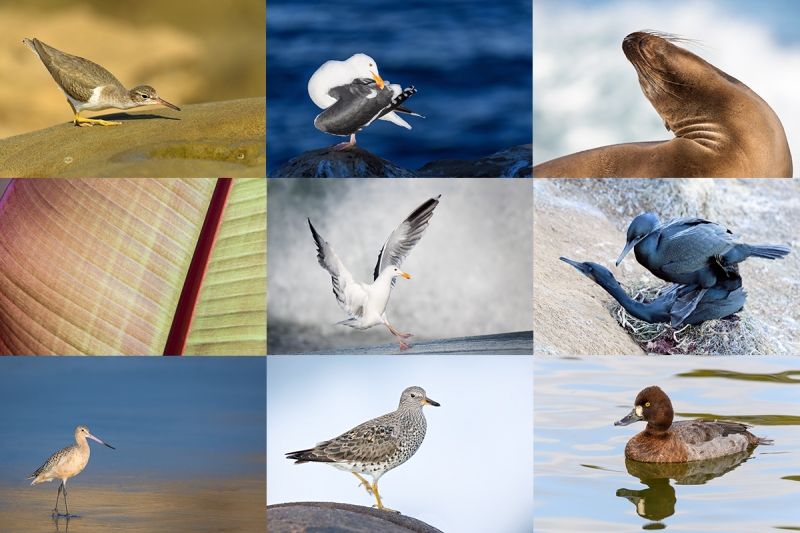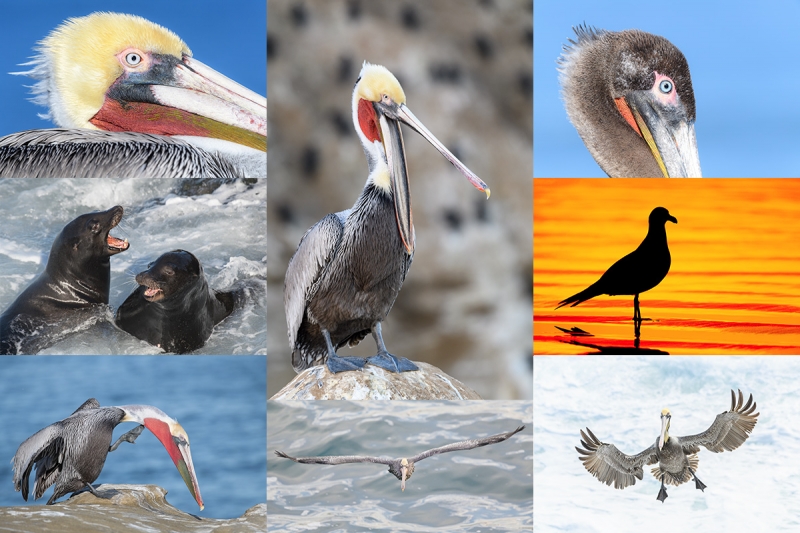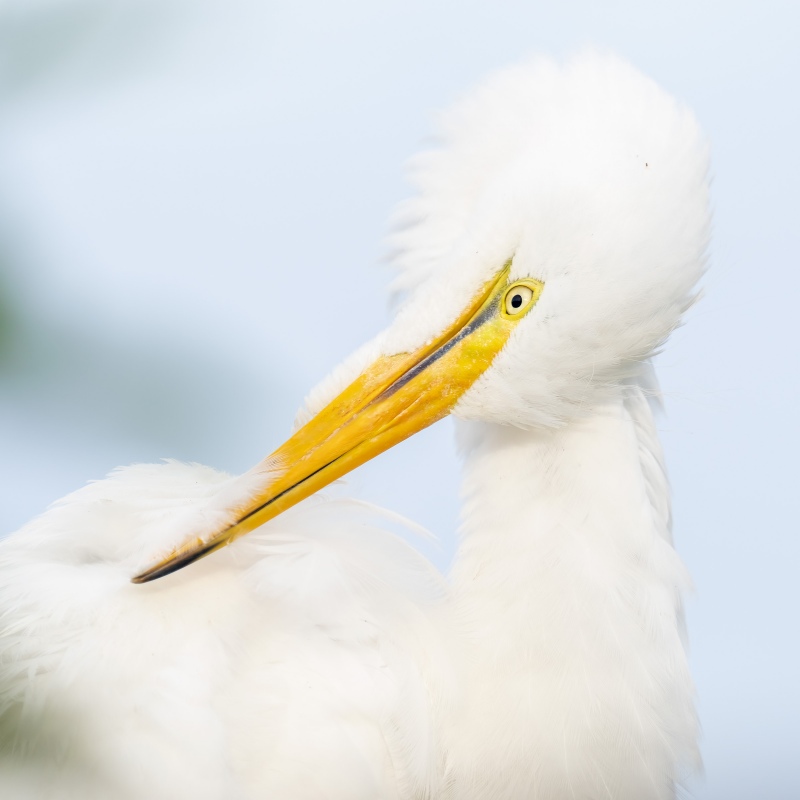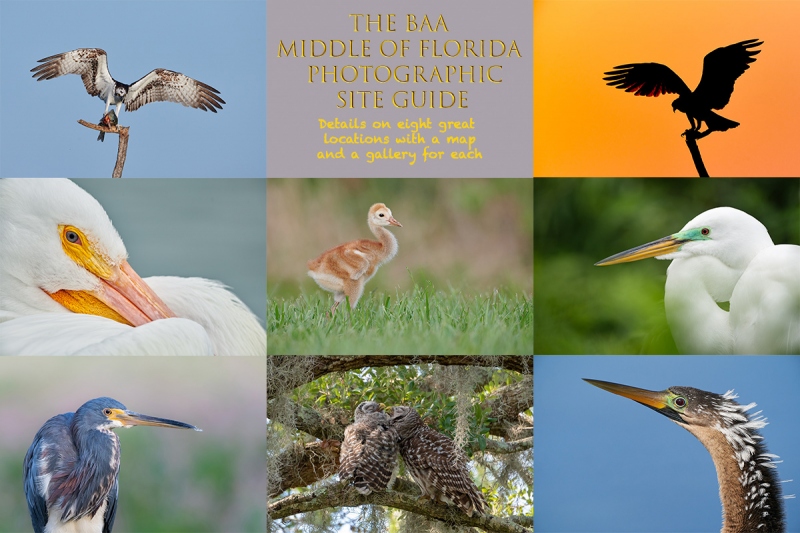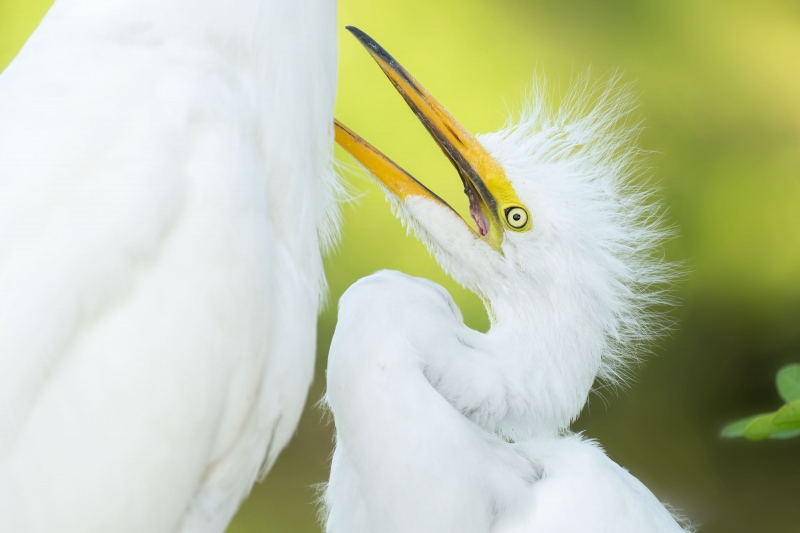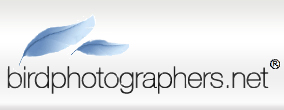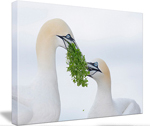May 4th, 2022 Your Favorite Image?
Which of today’s three featured square images do you like best? All are invited to leave a comment and let us know why they made their choice.
What’s Up?
I met Anar early on Tuesday morning. We began by working on her a1 set-up; she was in pretty good shape. Because she has small hands, she likes the ISO on the index finger wheel rather than on the thumb dial. As I had showed her a few pleasing blurs from my Sunday visit, she was anxious to get started. Because we can get lots of green in the background when doing blurs at Stick Marsh, it is best to work in Manual mode. I taught her to get the right exposure by adding 1 2/3 stops to the meter reading off the still, gray water. We had non-stop action for well more than an hour, but when it got brighter, things slowed down. She learned so much in such a short time and had so much fun that she is coming back for a second session on Thursday.
After brunch at home, I got my nap, did my bursts, and enjoyed a sunny afternoon swim. Today is Wednesday 4 May 2022. The morning forecast for ILE is for partly cloudy with almost no wind. I will head down to the lake for a short session. Wherever you are and whatever you are doing, I hope that you too have a great day. This blog post took about 90 minutes to prepare and makes fifty-four days in a row with a new one.
Please remember to use the B&H and Amazon links that are found on most blog pages and to use the BIRDSASART discount code at checkout when purchasing your new gear from Bedfords. Please, also, consider joining a BAA IPT. You will be amazed at how much you will learn!
|
|
|
Click on the composite image to enjoy the incredible quality of the hi-res JPEG.
Clockwise from upper left back around to the center: spoonbill with mangrove background; spoonbill head and shoulders portrait; spoonbill braking to land; spoonbill dramatic landing pose; adult Black-crowned Night-Heron; spoonbill with nesting material; Great Egret returning to nest; incoming spoonbill; and Limpkin landing.
|
Stick Marsh In-the-Field Sessions
6:30 to 9:00am: $250.00/person
Two 1/2 hours of intensive flight photography instruction: $250/person. Cheap! If you are interested, please contact me ASAP via e-mail and we can set up a session or two based on the weather forecast. The weather is looking fine for this Thursday and for next Monday and Tuesday. I am not sure how long the action will last, so the sooner the better.
BIRDS AS ART Image Optimization Service (BAA IOS)
Send a PayPal for $62.00 to birdsasart@verizon.net or call Jim at 863-692-0906 and put $62.00 on your credit card. Pick one of your best images and upload the raw file using a large file sending service like Hightail or DropBox and then send me the link via e-mail. I will download and save your raw file, evaluate the exposure and sharpness, and optimize the image as if it were my own after converting the raw file in Adobe Camera Raw. Best of all, I will make a screen recording of the entire process and send you a link to the video to download, save and study.
Just for the Record
If you are not using a Sony a1 for bird photography, you are making your life far more difficult than it needs to be. Period. If you would like to receive a short but frank e-mail explaining why the Sony a1 is so much better than the best Nikon and Canon mirrorless camera bodies, please click here.
And Please Remember
You can find some great photo accessories (and necessities, like surf booties!) on Amazon by clicking on the Stuff tab on the orange/yellow menu bar above. On a related note, it would be extremely helpful if blog-folks who, like me, spend too much money on Amazon, would get in the habit of clicking on the Amazon logo link on the right side of each blog post when they shop online. As you might expect, doing so will not cost you a single penny, but would be appreciated tremendously by yours truly. And doing so works seamlessly with your Amazon Prime account.
Please remember that if an item — a Delkin flash card, or a tripod head — for example, that is available from B&H and/or Bedfords, is also available in the BAA Online Store, it would be great, and greatly appreciated, if you would opt to purchase from us. We will match any price. Please remember also to use my B&H affiliate links or to earn 3% cash back at Bedfords by using the BIRDSASART discount code at checkout for your major gear purchases. Doing either often earns you free guides and/or discounts. And always earns my great appreciation.
Brand-New and As-Good-As-Ever Bedfords BAA Discount Policy
Folks who have fallen in love with Bedfords can now use the BIRDSASART coupon code at checkout to enjoy a post-purchase, 3% off-statement credit (excluding taxes and shipping charges) on orders paid with a credit card. The 3% credit will be refunded to the card you used for your purchase. Be sure, also, to check the box for free shipping to enjoy free Second Day Air Fed-Ex. This offer does not apply to purchases of Classes, Gift Cards, or to any prior purchases.
Money Saving Reminder
Many have learned that if you need a hot photo item that is out of stock at B&H and would like to enjoy getting 3% back on your credit card along with free 2nd Day Air Fed-Ex Air shipping, your best bet is to click here, place an order with Bedfords, and enter the coupon code BIRDSASART at checkout. If an item is out of stock, contact Steve Elkins via e-mail or on his cell phone at (479) 381-2592 (Central time). Be sure to mention the BIRDSASART coupon code and check the box for Free Shipping. That will automatically upgrade to free 2nd Day Air Fed-Ex. Steve has been great at getting folks the hot items that are out of stock at B&H and everywhere else. The waitlists at the big stores can be a year or longer for the hard-to-get items. Steve will surely get you your gear long before that. For the past year, he has been helping BAA Blog folks get their hands on items like the SONY a 1, the SONY 200-600 G OSS lens, the Canon EOS R5, the Canon RF 100-500mm lens, and the Nikon 500mm PF. Steve is personable, helpful, and eager to please.
Important Note
As an Amazon Associate, I earn a small percentage when you purchase from Amazon after using any of the Amazon links on the blog (including the logo-link immediately above). My link works with Amazon Prime and using it will not cost you a single cent. Huge thanks, BTW 🙂
Please Remember Also
Please, if you enjoy and learn from the blog, remember to use one of my two affiliate programs when purchasing new gear. Doing so just might make it possible for me to avoid having to try to get a job as a Walmart greeter and will not cost you a single penny more. And if you use Bedfords and remember to enter the BIRDSASART code at checkout, you will (still!) save 3% on every order and enjoy free second-day air shipping. In these crazy times — I lost about fifty thousand dollars in income due to COVID 19 — remembering to use my B&H link or to shop at Bedfords will help me out a ton and be greatly appreciated. Overseas folks who cannot order from the US because of import fees, duties, and taxes, are invited to help out by clicking here to leave a blog thank you gift if they see fit.


Gear Questions and Advice
Too many folks attending BAA IPTs and dozens of photographers whom I see in the field and on BPN, are–out of ignorance–using the wrong gear, especially when it comes to tripods and more especially, tripod heads… Please know that I am always glad to answer your gear questions via e-mail. If you are desperate, you can try me on my cell at 863-221-2372. Please leave a message and shoot me a text if I do not pick up.
|
|
|
This image was created on 1 May 2022 at Stick Marsh. I used the hand held Sony FE 70-200mm f/2.8 GM OSS II lens with the Sony FE 1.4x Teleconverter (at 280mm) and The One, the Sony Alpha 1 Mirrorless Digital Camera.. The exposure was determined via Zebras. ISO 5000: 1/2000 sec. at f/4 (wide open) in Manual mode. RawDigger showed that the raw file brightness was about 1/2 stop too dark. AWB at 6:52:04 am just after sunrise with a cloud blocking the sun.
Tracking: Zone AF/C with Bird-Eye/Face Detection performed perfectly. Click on the image to enjoy a high-res version.
Image #1: Roseate Spoonbill coming in for landing
|
Use a Fast Lens & a High ISO to Conquer Low Light
Wanting to create some sharp images in low very low light I turned to the 70–200 f/2.8 GM II lens with the 1.4X TC and the a1. That combo yields 280mm of reach at f/4. And I cheated a bit on the ISO at 5000. Topaz DeNoise handled the ISO 5000 image with ease. Making clean, bright, and noise-free images at ISO 5000 is a whole new world thanks to DeNoise. Folks need to learn not to fear high ISOs when they are needed to create sharp images.
Topaz DeNoise
As regular readers know, I run DeNoise on virtually every image that I process immediately after executing the crop with the Delete Cropped Pixels box checked. For images made in sunny conditions, I used Standard. For images made in low light, I use Low Light. You can check all four methods by using the Comparison View but I rarely do that anymore as I am confident as noted above.
Great Topaz News!
Folks who use the BAA Topaz link to purchase Sharpen AI, DeNoise AI, or the Utility Bundle (or any other Topaz plug-ins), will receive a 15% discount by entering the ARTHUR15 code at checkout. If the stuff is on sale (as it usually is), you save 15% off of the sale price! To get the discount you must use my link and you must enter the discount code. Be sure to start with this link.
Those who purchase Sharpen AI, DeNoise AI, or any other Topaz plug-ins using my link and then entering the ARTHUR15 code at checkout can e-mail to request a short Getting Started with Topaz e-Guide. Please include a copy of your Topaz receipt that shows the discount. Aside from the basics, the guide explains how to install the plug-ins so that they appear in the Photoshop Filter Menu.
|
|
|
This image was also created on 1 May 2022 at Stick Marsh. While seated, I used the hand held Sony FE 600mm f/4 GM OSS lens with the Sony FE 1.4x Teleconverter, and The One, the Sony Alpha 1 Mirrorless Digital Camera.. ISO 640. The exposure was determined using Zebra technology with ISO on the rear wheel: 1/2500 sec. at f/5.6 (wide open) in Manual mode. RawDigger showed that the raw file was about 1/3 stop too dark. In other words, pretty good and better than most. AWB at 8:42:15am on a by then sunny morning.
Tracking: Zone AF-C with Bird-Eye/Face Detection performed very well. Click on the image to enjoy the high-res version.
Image #2: Roseate Spoonbill with nesting material
|
AF Question
Whatever system you are using, would a wide AF pattern be best for this image? Or should you be using some type of single point AF? Why?
My Favorite Part of This Image
Click on the image to view the high-res version and if you think you can spot my very favorite part of this image, leave a comment.
|
|
|
This image was also created on 1 May 2022 at Stick Marsh. Again, while seated, I used the hand held Sony FE 600mm f/4 GM OSS lens with the Sony FE 1.4x Teleconverter, and The One, the Sony Alpha 1 Mirrorless Digital Camera.. ISO 640. The exposure was determined using Zebra technology with ISO on the rear wheel: 1/3200 sec. at f/5.6 (wide open) in Manual mode. RawDigger showed that the raw file was less than 1/3 stop under. AWB at 8:56:51am on a by then sunny morning.
Tracking: Zone AF-C with Bird-Eye/Face Detection performed very well. Click on the image to enjoy the high-res version.
Image #3: Roseate Spoonbill arguing with another one nearby
|
The Blue Neck Patch
I think that the blue triangle on this spoonbill’s neck is the skin on the neck, revealed due to excessive feather wear. What do you think?
|
|
|
Click on the composite image to enjoy the incredible quality of the hi-res JPEG.
Clockwise from upper left clockwise and back around to the center: Royal Tern in flight with squid for chick; Royal Tern chick on beach; Royal Tern in flight with shrimp for young; Royal Tern chick — double overhead wing stretch; Royal Tern landing with greenback for chick; Royal Tern in flight with juvenile mahi mahi for chick; Brown Pelican — large chick preening; Laughing Gull in fresh juvenal plumage; Royal Tern chick begging; Many Royal Terns with many chicks on face of dune.
|
Jacksonville IPT: #1: 4 FULL DAYS — the afternoon of 16 June thru the morning of MON 20 June 2022: $2,099.00. (Limit 6 photographers)
Jacksonville IPT #2: the afternoon of FRI 1 JULY thru the morning of TUES 5 July 2022: $2099.00 (Limit 6 photographers)
Jacksonville IPT #3: the afternoon of FRI 15 JULY thru the morning of TUES 19 July 2022: $2099.00 (Limit 6 photographers)
Ride with me: add $200.00. I do not like to disappoint: each trip will run with one participant. If necessary.
I first visited the breeding bird colony at Jacksonville in late June 2021. I was astounded. There were many thousands of pairs of Royal Terns nesting along with about 10,000 pairs of Laughing Gulls. In addition to the royals, there were some Sandwich Terns nesting. And there are several dozen pairs of Brown Pelicans nesting on the ground. Flight photography was non-stop astounding. And photographing the tern chicks was relatively easy. Folks could do the whole trip with the Sony 200-600, the Canon 100-500 RF, or the Nikon 500 PF or 200-500 VR. With a TC in your pocket for use on sunny days. Most of the action is within 100 yards of where we park (on the beach). As with all bird photography, there are times when a super-telephoto lens with either TC is the best tool for the job.
Morning sessions will average about three hours, afternoon sessions about 1 1/2 hours. On cloudy mornings with favorable winds, we may opt to stay out for one long session and skip the afternoon, especially when the afternoon forecast is poor. Lunch is included on the first three days of the IPT and will be served at my AirBnB. After the first lunch there will be an introductory program. On days two and three we will do image review and Photoshop after lunch.
We will be based somewhere west and a bit north of Jacksonville where there are many AirBnB possibilities. The deposit is $599.00. Call Jim at the office any weekday at 863-692-0906 to pay by credit card. Balances must be paid by check.
What You Will Learn on a Jacksonville IPT
- 1- First and foremast you will learn to become a better flight photographer. Much better.
- 2-You will learn the basics and fine points of digital exposure. Nikon and Canon folks will learn to get the right exposure every time after making a single test exposure, and SONY folks will learn to use Zebras so that they can be sure of making excellent exposures before pressing the shutter button.
- 3- You will learn to work in Manual exposure mode even if you fear it.
- 4- You will learn to evaluate wind and sky conditions and understand how they affect bird photography, especially the photography of birds in flight.
- 5- You will learn several pro secrets (for each system) that will help you to become a better flight photographer.
- 6- You will learn to zoom out in advance (because the birds are so close!) 🙂
- 7- You will learn how to approach free and wild birds without disturbing them.
- 8- You will learn to spot the good and the great situations.
- 9- You will learn to understand and predict bird behavior.
- 10- You will learn to design pleasing images by mastering your camera’s AF system.
- 11- You will learn to choose the best perspective.
- 12- You will learn to see and control your backgrounds.
- 13- You will learn to see and understand the light.
- 14- You will learn to see and create pleasing blurs in pre-dawn situations.
- 15- You will learn to be ready for the most likely event.
And the best news is that you will be able to take everything you learn home with you so that you will be a better photographer wherever you are and whenever you photograph.
Typos
With all blog posts, feel free to e-mail or to leave a comment regarding any typos or errors.
May 3rd, 2022 What’s Up?
Monday dawned slightly foggy and very still here at ILE. I saw the large sandhill colts and the baby crane with their respective parents. The young eagle was in the nest tree with one of the adults. I created a foggy Osprey silhouette from my SUV with the big lens on the BLUBB. I saw something huge in the North Field. It looked about as big as a Volkswagen. As I got closer, I saw that it was a displaying Wild Turkey tom. He was not very cooperative … After that, I was not feeling very inspired, so I headed home at about 7:40am to do the blooming sunflowers in our backyard butterfly garden. I used the Sony 70-200mm f/2.8 II lens with the 2X TC — I should have gone with the 1.4X TC, and the a1. I used my lightweight tripod set-up, the Flex-shooter Mini with the no longer available Induro GIT 204 tripod. As expected, I got some nice ones and will share the best of those here soon.
Today is Tuesday 3 May 2022. I am meeting an In-the-Field client at Stick Marsh at 6:45am. The weather for Fellsmere is looking decent: partly to mostly cloudy with an ESE breeze. Anar is heading back home to California on Friday and was anxious to get some instruction on both her 200-600/a1 rig and bird photography, especially birds in flight. Wherever you are and whatever you are doing, I hope that you too have a great day. This blog post took about 90 minutes to prepare and makes fifty-three days in a row with a new one.
Please remember to use the B&H and Amazon links that are found on most blog pages and to use the BIRDSASART discount code at checkout when purchasing your new gear from Bedfords. Please, also, consider joining a BAA IPT. You will be amazed at how much you will learn!
|
|
|
Click on the composite image to enjoy the incredible quality of the hi-res JPEG.
Clockwise from upper left back around to the center: spoonbill with mangrove background; spoonbill head and shoulders portrait; spoonbill braking to land; spoonbill dramatic landing pose; adult Black-crowned Night-Heron; spoonbill with nesting material; Great Egret returning to nest; incoming spoonbill; and Limpkin landing.
|
Stick Marsh In-the-Field Sessions
6:45 to 9:15am: $250.00/person
Two 1/2 hours of intensive flight photography instruction: $250/person. Cheap! If you are interested, please contact me ASAP via e-mail and we can set up a session or two based on the weather forecast. The weather is looking fine for this Thursday and all of the following week beginning on Monday. Though photography on Sunday morning was not as good as the best days last April, it was quite excellent; I created 2230 images and kept 112 after the first edit! As I am not sure how long the action will last, the sooner the better.
Canon EF 300mm f/2.8L IS Lens
BAA friend Robert Peltz is offering a Canon EF 300mm f/2.8L IS lens (the original IS version) in near-like new condition with a very few blemishes on the lens foot for a very low $1699.00. The sale includes the lens trunk, the rear lens cover, the front lens cover, the lens strap, and insured ground shipping via major courier to lower-48 US addresses only. Your item will not ship until your check clears or other arrangements are made.
Contact Bob via e-mail.
The 300mm f/2.8 lenses have long been the favorite of the world’s best hawks in flight photographers, often with the 1.4X TC. As a workhorse lens, they do well with both TCs including the 2X teleconverter. I loved my Canon 300 f/2.8s. Right now, the lack of this easily hand holdable super sharp lens is the biggest hole in the Sony lens line-up. The newer Canon version sells new right now for $6099.00. Both lenses would do well with an R5 or an R3 and one of the EF/RF adapters. But you can save a chunk of bucks by grabbing Bob’s lens today. artie
Canon EF Extender 1.4X III
BAA friend Robert Peltz is offering a Canon EF Extender 1.4X III in like-new condition for a very low $239.00. The sale includes the front and rear lens covers, the lens pouch, and insured ground shipping via major courier to lower-48 US addresses only. Your item will not ship until your check clears or other arrangements are made.
Please contact Bob via e-mail.
As regular readers know, TCs are so important to what I do that I always travel with three 1.4X teleconverters and two 2X teleconverters. (Note: they do fail on occasion …) artie
Canon EF Extender 2X III
BAA friend Robert Peltz is offering a Canon EF Extender 2X III in like-new condition for a very low $249.00. The sale includes the front and rear lens covers, the lens pouch, and insured ground shipping via major courier to lower-48 US addresses only. Your item will not ship until your check clears or other arrangements are made.
Please contact Bob via e-mail.
As regular readers know, TCs are so important to what I do that I always travel with three 1.4X teleconverters and two 2X teleconverters. (Note: they do fail on occasion …) artie
|
|
|
This image was created on 1 May 2022 at Stick Marsh. I used the hand held Sony FE 70-200mm f/2.8 GM OSS II lens with the Sony FE 1.4x Teleconverter (at 280mm) and The One, the Sony Alpha 1 Mirrorless Digital Camera.. The exposure was determined via Zebras. ISO 3200: 1/2000 sec. at f/4 (wide open) in Manual mode. AWB at 7:00:22am just after sunrise with a cloud blocking the sun.
Tracking: Zone AF/C with Bird-Eye/Face Detection performed perfectly. Click on the image to enjoy a high-res version.
Image #1: Roseate Spoonbill landing with marsh in background
|
It Was a Long Time Coming
I had had the feeling for quite some time that the new Sony FE 70-200mm f/2.8 GM OSS II lens with either teleconverter would be deadly at Stick Marsh. But with the late nesting season, several mornings with a NW wind when I stayed home, my trip to the GNPA EXPO, and then COVID, I never had the chance to try it. Until Sunday past. It was as deadly as I thought it would be. The lens is relatively tiny, the zoom mechanism is fast and sure, and AF is much improved from the original version.
All are invited to critique this image. What do you like? What don’t you like?
|
|
|
This image was also created on 1 May 2022 at Stick Marsh. While seated, I used the hand held Sony FE 600mm f/4 GM OSS lens with the Sony FE 1.4x Teleconverter, and The One, the Sony Alpha 1 Mirrorless Digital Camera.. ISO 640. The exposure was determined using Zebra technology with ISO on the rear wheel: 1/2000 sec. at f/5.6 (wide open) in Manual mode. RawDigger showed that the raw exposure was a bit too bright (but the WHITEs were easily recovered during the raw conversion as all of the OvExp pixels were in the GREEN channel). AWB at 8:44:14am on a by then sunny morning.
Tracking: Zone AF-C with Bird-Eye/Face Detection performed very well. Click on the image to enjoy the high-res version.
Image #2: Roseate Spoonbill tight incoming flight pano crop
|
Clipped But Too Good to Trash
With the incredible AF system of the a1 it is not uncommon to keep firing when a bird in flight gets relatively close, too close to fit into the frame. Yet the images are often razor sharp on the eye. There are lots of time where I will execute a “cut-rather-than-clip” crop as I did with Image #2 above. What do you think of my tight flight pano crop?
|
|
|
This all-new card includes images created on my JAN 2022 visit to San Diego. Click on the composite to enjoy a larger version.
|
The 2022/23 San Diego Brown Pelicans (and more!) IPTs
San Diego IPT #1. 3 1/2 DAYS: WED 21 DEC thru the morning session on Saturday 24 DEC 2022. $2099.00. Deposit: $699.00. Limit: 6 photographers.
San Diego IPT #2. 4 1/2 DAYS: SAT 7 JAN thru the morning session on WED 11 JAN 2023: $2699.00. Deposit: $699.00. Limit: 6 photographers/Openings: 4.
San Diego IPT #3: 3 1/2 DAYS: FRI 20 JAN thru the morning session on MON 23 JAN 2023: $2099.00. Deposit: $699.00.
Please e-mail for information on personalized pre- and post-IPT sessions.
Join me in San Diego to photograph the spectacular breeding plumage Brown Pelicans with their fire-engine red and olive green bill pouches; Brandt’s (nesting) and Double-crested Cormorants; breeding plumage Wood and Ring-necked Ducks; other duck species possible including Lesser Scaup, Redhead, Northern Shoveler and Surf Scoter; a variety of gulls including Western, California, and the gorgeous Heermann’s, all in full breeding plumage; shorebirds including Marbled Godwit, Willet, Sanderling and Black-bellied Plover; many others are possible including Least, Western, and Spotted Sandpiper, Whimbrel, Black and Ruddy Turnstone, Semipalmated Plover, and Surfbird; Harbor Seals and California Sea Lions (both depending on the current regulations and restrictions). And as you can see by studying the IPT cards, there are some nice bird-scape and landscape opportunities as well. Not to mention a ton of excellent flight photography opportunities and instruction.
Please note: where permitted and on occasion, ducks and gulls may be attracted (or re-located) with offerings of grains or healthy bread.
|
|
|
San Diego offers a wealth of very attractive natural history subjects, including and especially the Pacific race of California Brown Pelican. With annual visits spanning more than four decades, I have lots of photographic experience there … Click on the composite to enjoy a larger version.
|
Learning Exposure, Whether You Like It Or Not
Whether you like it or not, we will be beating the subject of exposure like a dead horse. In every new situation, you will hear my thoughts on the exposure situation along with my thoughts on both Nikon and Canon histograms and SONY Zebras. Whether you like it or not, you will learn to work in manual mode and to get the right exposure every time as long as a bird gives you ten seconds with the light constant. (Or two seconds with SONY zebras…) And you will learn what to do when the light is changing constantly. What you learn about exposure is one of the great takeaways on every IPT.
|
|
|
Though the pelicans will be the stars of the show on this IPT, there will be many other handsome and captivating subjects in wonderful settings. Click on the composite to enjoy a larger version.
|
It Ain’t Just Pelicans
With gorgeous subjects just sitting there waiting to have their pictures taken, photographing the pelicans on the cliffs is about as easy as nature photography gets. With the winds from the east almost every morning there is usually some excellent flight photography as well, often with 70-200mm lenses! And the pelicans are almost always doing something interesting: preening, scratching, bill pouch cleaning, or squabbling. And then there are those crazy head throws that are thought to be a form of intra-flock communication. You will be guided as to how to make the best of those opportunities. And depending on the weather and local conditions and tides, there are a variety of other fabulous photo chances available in and around San Diego.
|
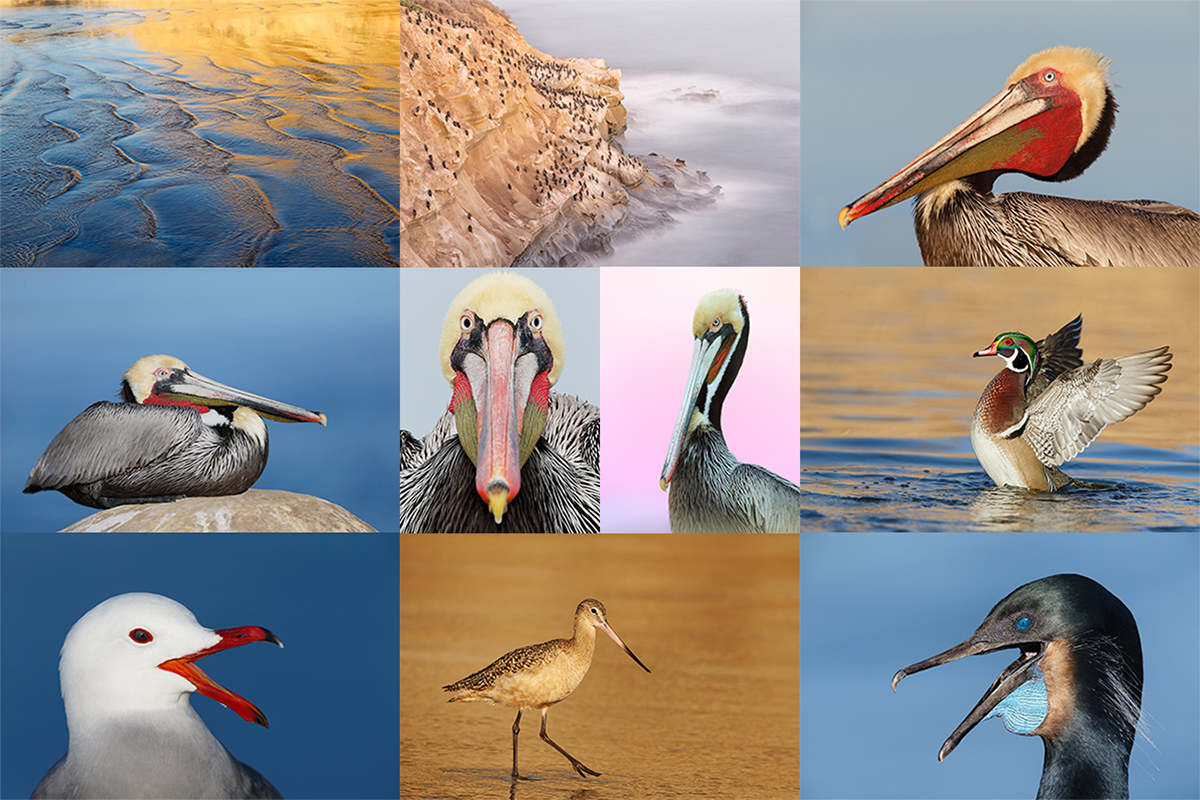
|
|
Did I mention that there are lots of great birds and natural history subjects in San Diego in winter? Click on the composite to enjoy a larger version.
|
The San Diego Details
These IPTs will include four or five 3-hour morning photo sessions, three or four 1 1/2-hour afternoon photo sessions, and three or four working brunches that will include image review and Photoshop sessions. On rare cloudy days, we may — at the leader’s discretion, stay out in the morning for a long session and skip that afternoon. To ensure early starts, breakfasts will be your responsibility. And so that we can get some sleep, dinners will be on your own as well. In the extremely unlikely event that Goldfish Point is closed due to local ordinance (or whimsy) — that has never happened in the past fifty years, I will of course do my very best to maximize our photographic opportunities.
A $599 deposit is required to hold your slot for one of the 2022/23 San Diego IPTs. You can send a check (made out to “BIRDS AS ART”) to us here: BIRDS AS ART, PO Box 7245, Indian Lake Estates, FL, 3385, or call Jim or Jennifer at the office with a credit card at 863-692-0906. Your balance, payable only by check, is due three months before the trip.
|
|
|
San Diego offers a wealth of very attractive natural history subjects, including and especially the Pacific race of California Brown Pelican. With annual visits spanning more than four decades, I have lots of photographic experience there … Click on the composite to enjoy a larger version.
|
Travel Insurance
Travel insurance for both big international trips and US-based IPTs is highly recommended as we never know what life has in store for us. I strongly recommend that you purchase quality travel insurance. Travel Insurance Services offers a variety of plans and options. Included with the Elite Option or available as an upgrade to the Basic & Plus Options you can also purchase Cancel for Any Reason Coverage that expands the list of reasons for your canceling to include things such as sudden work or family obligation and even a simple change of mind. My family and I use and depend on the great policies offered by TIS whenever we travel. You can learn more here: Travel Insurance Services. Do note that many plans require that you purchase your travel insurance within 14 days of our cashing your deposit check or running your credit card. Whenever purchasing travel insurance, be sure to read the fine print carefully even when dealing with reputable firms like TSI.
|
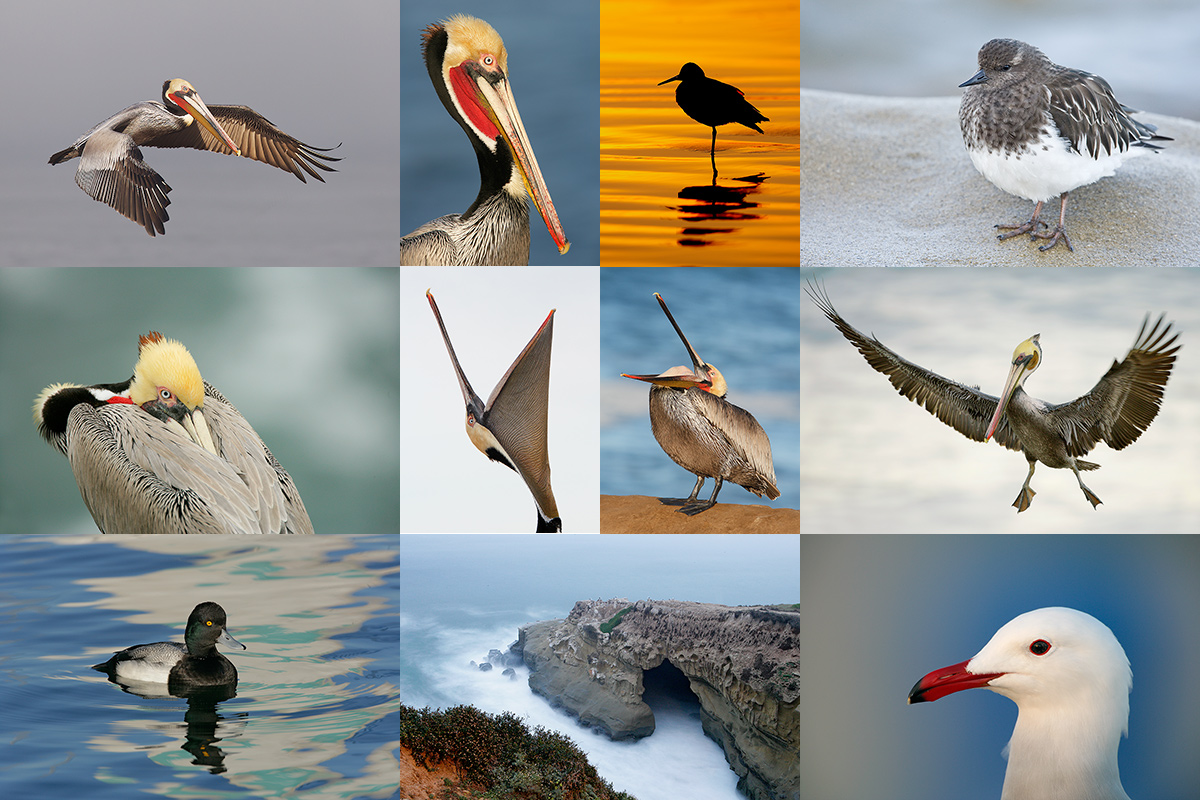
|
|
Variety is surely the spice of life in San Diego. Click on the composite to enjoy a larger version.
|
Getting Up Early and Staying Out Late
On all BIRDS AS ART IPTS including and especially the San Diego IPT, we get into the field early to take advantage of unique and often spectacular lighting conditions and we stay out late to maximize the chances of killer light and glorious sunset silhouette situations. We often arrive at the cliffs a full hour before anyone else shows up to check out the landscape and seascape opportunities.
Typos
With all blog posts, feel free to e-mail or to leave a comment regarding any typos or errors.
May 2nd, 2022 Your Favorite Image?
Which of today’s two featured images do you like best? All are invited to leave a comment and let us know why they made their choice.
What’s Up?
I woke early without the alarm and checked the weather forecast for Fellsmere. It was much improved from what they were saying the night before so I headed to Stick Marsh for only the second time this year. I was very glad that I went. I created 2230 images and kept 112 after the first edit! In the afternoon I napped, did my bursts, and swam. Then I watched the two NBA playoff games and took a walk.
Today is Monday 2 May 2022. The forecast for ILE for the morning is for partly cloudy with a very gentle east breeze. Flowers anyone? Wherever you are and whatever you are doing, I hope that you too have a great day. This blog post took about 90 minutes to prepare and makes fifty-two days in a row with a new one.
Please remember to use the B&H and Amazon links that are found on most blog pages and to use the BIRDSASART discount code at checkout when purchasing your new gear from Bedfords. Please, also, consider joining a BAA IPT. You will be amazed at how much you will learn!
Gatorland Update
Though there are far fewer birds nesting this season than in recent memory, photography was quite good on my Saturday 30 April visit. And best of all, there were very few photographers present. Photographing at rookeries is always a big challenge. Consider spending two hours with me on Sunday 8 May and learning to see the shot. Note that both of today’s featured images were created with the Sony 70-200mm f/2.8 GM II lens with a 2X TC. This combination is deadly in tight quarters.
Gatorland In-the-Field Session
Sunday 8 May 2022. 7:00 to 9:00am: $200.00/person
Two hours of intensive instruction. Cheap! You need to have a season photo pass or purchase one for that date to enter. If you are interested, please contact me ASAP via e-mail.
2022 Gatorland Photographer’s Pass Program
Though the 2022 Gatorland Photographer’s Pass Program (GPPP) is much improved from last year’s program, it falls well short of the great program that was in effect BC (Before Covid). I am hoping that the program will be restored to its former greatness next year. This year’s program includes ten scheduled days. The first is on 19 March, and the last is 21 May 2022. And it gives photographers the opportunity to get into the park at 7:00 am instead of the normal 10:00 am entry time.
Reservations are required two days before your visit. For example, if you wish to visit on 27 March, you need to make your reservation on March 25th. You can make reservations here on the Gatorland website, or by calling 407-855-5496 ext. 226 during business hours with your credit card in hand. There is no late stay option this year. The price is $25.00 + tax per visit and includes early entry at 7:00 AM at the SOUTH ENTRANCE. All tickets are date specific and non-transferable. You will not be able to leave until 10:00am when Gatorland opens.
Choose from the remaining 2022 dates:
May 8, 2022
May 14, 2022
May 21, 2022
A far better deal for folks who live in the area was the Birding Seasonal pass for $125.00 per person. That included visits on all ten dates. And best of all, you can never be shut out. If like me, you are on the list for the Birding Seasonal pass, you can show up on any of the GPPP days, have your name checked off the list, and enjoy a great morning of photography.
If you have a party of 15 or more folks and would like to book a Private Group early entry, Gatorland is able to offer additional dates of your choice (subject to availability and pending approval). Please contact: JoIndomenico@gatorland.com.
The famous Gatorland Bird Rookery was created in 1991 as an alligator breeding marsh. While the birds lose an occasional chick to the gators, they gain protection from ground predators. This unique habitat has grown into one of the largest and most accessible wading bird rookeries in Florida. Today, this area provides protected nesting, foraging, and roosting area to more than 20 different species of birds, many of which are listed as Endangered or Species of Special Concern. Gatorland’s boardwalks provide birders and photographers with access to these incredible birds, their nests, and their young, allowing people to safely observe them while capturing stunning photographs.
You can learn exactly how to make the best possible photographs at Gatorland in here ; details on that below.
BIRDS AS ART Image Optimization Service (BAA IOS)
Send a PayPal for $62.00 to birdsasart@verizon.net or call Jim at 863-692-0906 and put $62.00 on your credit card. Pick one of your best images and upload the raw file using a large file sending service like Hightail or DropBox and then send me the link via e-mail. I will download and save your raw file, evaluate the exposure and sharpness, and optimize the image as if it were my own after converting the raw file in Adobe Camera Raw. Best of all, I will make a screen recording of the entire process and send you a link to the video to download, save and study.
Just for the Record
If you are not using a Sony a1 for bird photography, you are making your life far more difficult than it needs to be. Period. If you would like to receive a short but frank e-mail explaining why the Sony a1 is so much better than the best Nikon and Canon mirrorless camera bodies, please click here.
And Please Remember
You can find some great photo accessories (and necessities, like surf booties!) on Amazon by clicking on the Stuff tab on the orange/yellow menu bar above. On a related note, it would be extremely helpful if blog-folks who, like me, spend too much money on Amazon, would get in the habit of clicking on the Amazon logo link on the right side of each blog post when they shop online. As you might expect, doing so will not cost you a single penny, but would be appreciated tremendously by yours truly. And doing so works seamlessly with your Amazon Prime account.
Please remember that if an item — a Delkin flash card, or a tripod head — for example, that is available from B&H and/or Bedfords, is also available in the BAA Online Store, it would be great, and greatly appreciated, if you would opt to purchase from us. We will match any price. Please remember also to use my B&H affiliate links or to earn 3% cash back at Bedfords by using the BIRDSASART discount code at checkout for your major gear purchases. Doing either often earns you free guides and/or discounts. And always earns my great appreciation.
Brand-New and As-Good-As-Ever Bedfords BAA Discount Policy
Folks who have fallen in love with Bedfords can now use the BIRDSASART coupon code at checkout to enjoy a post-purchase, 3% off-statement credit (excluding taxes and shipping charges) on orders paid with a credit card. The 3% credit will be refunded to the card you used for your purchase. Be sure, also, to check the box for free shipping to enjoy free Second Day Air Fed-Ex. This offer does not apply to purchases of Classes, Gift Cards, or to any prior purchases.
Money Saving Reminder
Many have learned that if you need a hot photo item that is out of stock at B&H and would like to enjoy getting 3% back on your credit card along with free 2nd Day Air Fed-Ex Air shipping, your best bet is to click here, place an order with Bedfords, and enter the coupon code BIRDSASART at checkout. If an item is out of stock, contact Steve Elkins via e-mail or on his cell phone at (479) 381-2592 (Central time). Be sure to mention the BIRDSASART coupon code and check the box for Free Shipping. That will automatically upgrade to free 2nd Day Air Fed-Ex. Steve has been great at getting folks the hot items that are out of stock at B&H and everywhere else. The waitlists at the big stores can be a year or longer for the hard-to-get items. Steve will surely get you your gear long before that. For the past year, he has been helping BAA Blog folks get their hands on items like the SONY a 1, the SONY 200-600 G OSS lens, the Canon EOS R5, the Canon RF 100-500mm lens, and the Nikon 500mm PF. Steve is personable, helpful, and eager to please.
Important Note
As an Amazon Associate, I earn a small percentage when you purchase from Amazon after using any of the Amazon links on the blog (including the logo-link immediately above). My link works with Amazon Prime and using it will not cost you a single cent. Huge thanks, BTW 🙂
Please Remember Also
Please, if you enjoy and learn from the blog, remember to use one of my two affiliate programs when purchasing new gear. Doing so just might make it possible for me to avoid having to try to get a job as a Walmart greeter and will not cost you a single penny more. And if you use Bedfords and remember to enter the BIRDSASART code at checkout, you will (still!) save 3% on every order and enjoy free second-day air shipping. In these crazy times — I lost about fifty thousand dollars in income due to COVID 19 — remembering to use my B&H link or to shop at Bedfords will help me out a ton and be greatly appreciated. Overseas folks who cannot order from the US because of import fees, duties, and taxes, are invited to help out by clicking here to leave a blog thank you gift if they see fit.


Gear Questions and Advice
Too many folks attending BAA IPTs and dozens of photographers whom I see in the field and on BPN, are–out of ignorance–using the wrong gear, especially when it comes to tripods and more especially, tripod heads… Please know that I am always glad to answer your gear questions via e-mail. If you are desperate, you can try me on my cell at 863-221-2372. Please leave a message and shoot me a text if I do not pick up.
|
|
|
This image was created on 30 April 2022 at Gatorland in Kissimmee, FL. I used the hand held Sony FE 70-200mm f/2.8 GM OSS II lens with the Sony FE 2x Teleconverter (at 400mm) and The One, the Sony Alpha 1 Mirrorless Digital Camera.. The exposure was determined via Zebras with ISO on the thumb dial. ISO 640: 1/640 sec. at f/5.6 (wide open) in Manual mode. AWB at 8:02:45am on a then mostly cloudy morning.
Tracking: Zone AF/C with Bird-Eye/Face Detection performed perfectly. Click on the image to enjoy a high-res version.
Image #1: Great Egret, very large chick preening
|
One of the Oldest, Simplest Tricks in the Book
I could not have made this image without using one of the oldest, simplest tricks in the book. The trick is in the Gatorland section of the BAA Middle of Florida Photographic Site Guide. This one trick alone is worth the price of admission, yet I have never seen anyone else use the trick. Except for folks doing an In-the-Field session with me …
|
|
The BAA Middle of Florida Photographic Site Guide
You can purchase your copy here in the BAA Online Store.
|
The BAA Middle of Florida Photographic Site Guide
126 pages, 87 photographs by Joe Przybyla and Arthur Morris.
The PDF for this e-Guide is an electronic download sent via e-mail.
Purchase your copy here in the BAA Online Store.
I had thought about doing a guide to some of the great but little-known photo hotspots around central Florida for about a decade, but those plans never came to fruition. I met Joe Przybyla online in the Avian Forum at BirdPhotographer’s.Net about two years ago. Joe’s photography has improved tremendously over the past few years; he credits the BAA blog, my books and PDFs, and his participation on BPN. The one thing that I learned right from the get-go about Joe is that he is a hard and tenacious worker, always striving to improve his skills and to grow his knowledge base. As he knew of more than a few good spots in central Florida, I broached the idea of us doing a photographic site guide that covered many of the little-known photographic hotspots from Brandon to Lakeland to Joe Overstreet Road to Indian Lake Estates (my Florida home for the past 20 years or so). After more than many, many dozens of hours of effort, The BIRDS AS ART Middle of Florida Photographic Site Guide is now a reality. Thanks to Joe’s wife Dottie for her review of our writing. We all learned once again that writing is a process, a back-and-forth process. All thanks to the white pelicans of Lakeland. Here are the locations that are detailed in this e-Guide:
- Indian Lake Estates: Sandhills Cranes with chicks and colts, lots of vultures, and Ospreys up the kazoo!
- Gatorland, Kissimmee: Learn to make great images of wading birds in a cluttered rookery.
- The Brandon Rookery: Great for nesting Wood Storks, Great Egrets, and more.
- Circle Bar B Reserve, Lakeland: Here you will find a great variety of avian subjects in a great variety of habitats.
- Lake Morton, Lakeland: There are lots of silly tame birds here including and especially American White Pelican during the colder months.
- Lake Mirror, Lakeland: Tame Anhingas, Limpkins, and a zillion White Ibises at times.
- West Lake Parker, Lakeland: Here you will have a chance for two difficult birds, Snail Kite, and Purple Gallinule.
- Joe Overstreet Road, Kenansville: Crested Caracara, meadowlarks, Loggerhead Shrike, and much more on the fenceposts and barbed wire.
Each location includes a map, a detailed description of the best spots, best season, light and time of day instructions, the expected species, and an educational and inspirational gallery that is designed to open your eyes as to the possibilities.
You can purchase a copy here in the BAA Online Store.
|
|
|
This image was also created on 30 April 2022 at Gatorland in Kissimmee, FL. Again, I used the hand held Sony FE 70-200mm f/2.8 GM OSS II lens with the Sony FE 2x Teleconverter (at 400mm) and The One, the Sony Alpha 1 Mirrorless Digital Camera.. The exposure was determined via Zebras with ISO on the thumb dial. ISO 1600: 1/1000 sec. at f/5.6 (wide open) in Manual mode. AWB at 8:47:17am in the shade on a then party sunny morning.
Tracking: Spot S AF-C with Bird-Eye/Face Detection performed perfectly. Click on the image to enjoy a high-res version.
Image #2: Great Egret, large chick begging
|
Dealing With Mayhem
When an adult Great Egret lands at the nest with a bellyful of fish for its large chicks, the ensuing scene can only be described as mayhem. The chicks peck at the adult’s neck and breast as she points her bill to the sky further encouraging the chaos. When the adult lowers her head just a bit, one of the chicks grabs the bill and yanks on it with all of its might. This encourages the adult bird to regurgitate some partially digested fish either directly into the mouth of the chick or onto the floor of the nest. This scene is repeated two or three more times until the parent bird flies off in search of more fish.
In low light situations, photographing the feeding/beggin mayhem is difficult; you find yourself wishing for high shutter speeds along with extra depth of field. But to get there, you would need a ridiculously high ISO. With image #2, I raised the ISO to get to 1/1000 second, went from Tracking: Zone to Tracking Spot S, and looked for lulls in the action. That strategy worked fairly well as I kept eight image created in a very challenging situation.
Typos
With all blog posts, feel free to e-mail or to leave a comment regarding any typos or errors.
|
|



